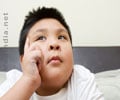
Over time, these mothers also gain more weight compared to all food-insecure men and food-insecure women not caring for children.
"We often forget that food insecurity is happening in a country as rich as ours," said Martin.
"Trying to protect children from food insecurity is not as rare as it once was, and it's been on the rise for the last two years, if not the last five years," she said.
Mothers, who are often the food managers in the household, may take several actions to ensure that their children are fed, including skipping meals and eating cheaper, but less nutritious foods.
"To make sure mothers can provide for their children, they may eat only once a day, for example, or they may eat erratically, which are all behaviors that are obesity risks," said Adam Lippert, graduate student in sociology, who worked with Martin.
Advertisement
They examined data on 7,931 participants in the Panel Study of Income Dynamics. The biennial study, which has collected information on health and income levels of Americans since 1968, began collecting data on weight and food insecurity in 1999.
Advertisement
"What this study suggests is that the relative safety net could be improved.
"While food pantries and food stamps shore up family needs, a lot of families are still struggling to meet basic nutritional needs - vitamins, minerals and key nutrient," she said.
The findings were reported in the current issue of Social Science and Medicine.
Source-ANI















